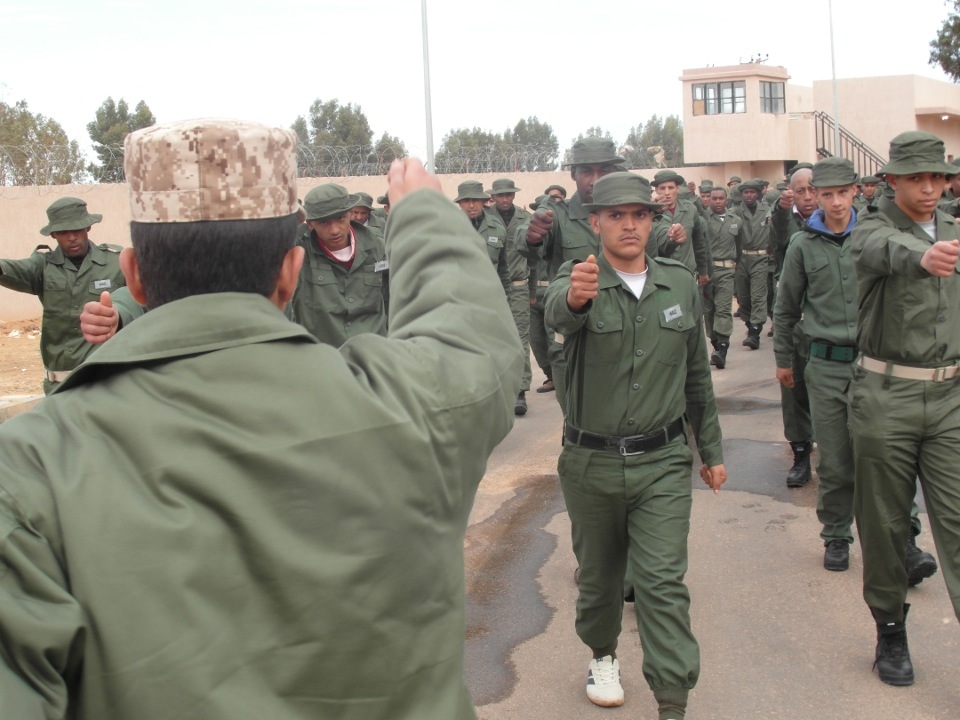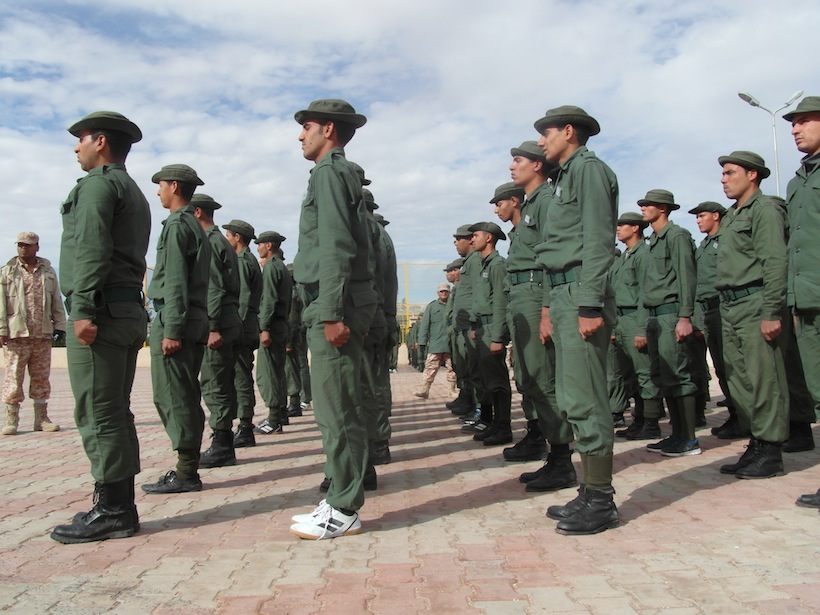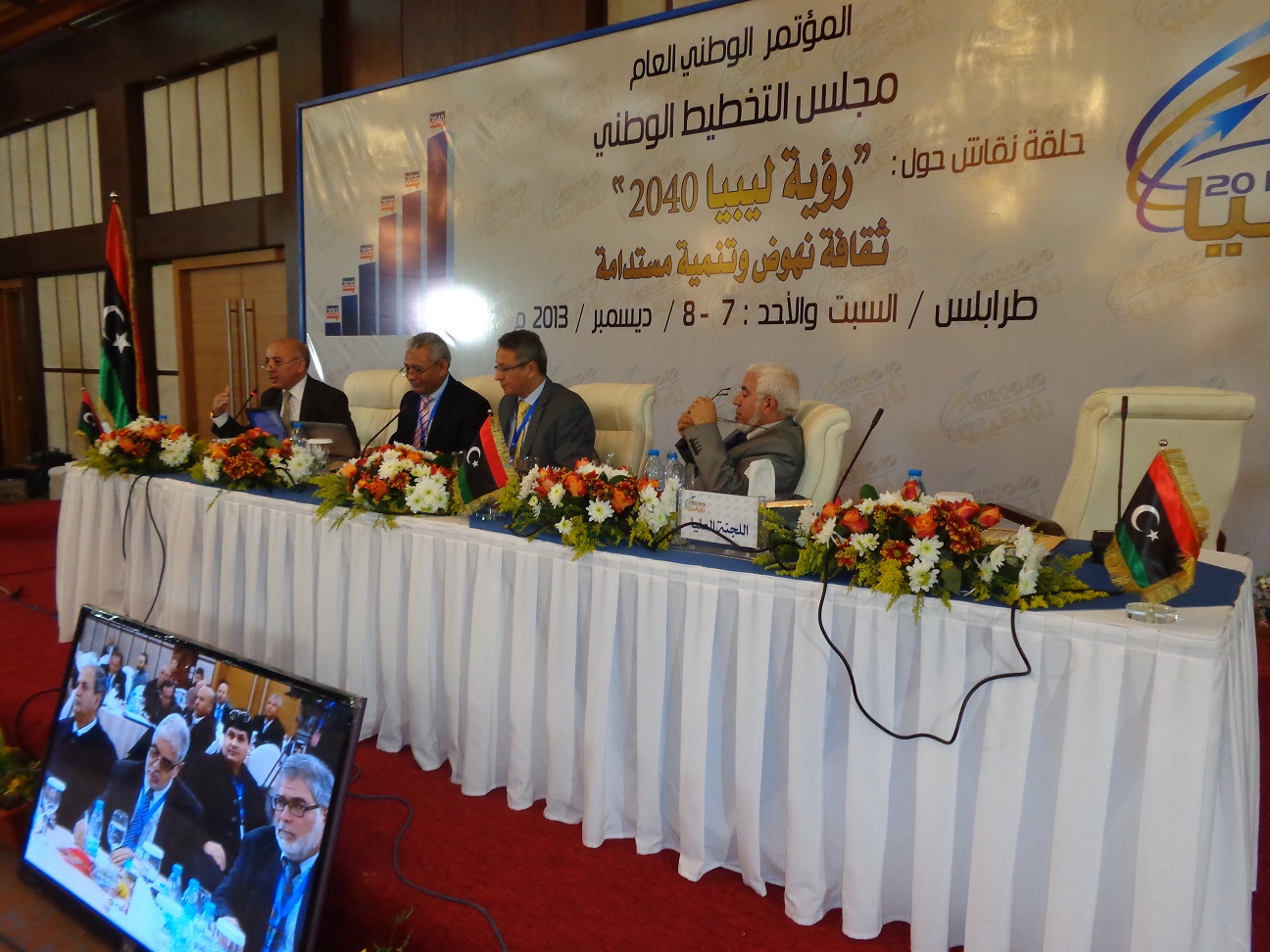By Mathieu Galtier.

Tripoli, 7 December 2013:
Most people consider them as the hope of a Libya free of brigades. “They” are to . . .[restrict]be the soldiers of Libya’s re-vamped army. In the meantime, though, they are just trainees facing a military programme in uneasy conditions like in Azziziya camp.
From a distance, the three “battalions” of new recruits look good practicing marching in the parade ground of the army camp at Azziziya. On a closer inspection, you cannot help but notice that the steps are not well-synchronised and uniforms are dissimilar. But the desire to learn to be proper soldiers is there.
The first trainees arrived more than a month ago, the most recent just a few days ago. In total, there are 400 men whose goal is to be part of Libyan army after this four-month training course. Aged 18 years and over, they are the second group to be trained at Azziziya.
Four hundred and fifty were in the first group from May to August 2013.
“Azzizya is the most important of all of them,” Colonel Fatih Ayad, the head of the centre, says proudly, referring to Libya’s army training camps. “We are the only one able to welcome more than 400 trainees. Others can host 200 persons, maximum.”
Libya has eleven official training camps.
In comparison of what the Libya Herald witnessed at a camp in Zawia in January, rules are tougher in Azziziya for the trainees. They have to pass medical tests to ensure they have no chronic disease such as diabetes, vision problems, and the like to join the course. They have to stay on the base for the first 45 days with no permission to leave. After a five-day break, the weekly system is five days in the camp, two days off.
Comprehensive training
The day starts at 5 am with a half an hour or an hour running. At ?7 am, there is breakfast then officers call the roll. From ?8 am to 2 pm there are classes: military administration, military planning, military strategy, telecommunication, theoretical and practical lessons about light weapons, marching, and more.
2 pm to 4 pm : Free time;
4 pm to 7 pm: Time dedicated to sports — football, handball, bodybuilding, and the like;
7pm : Dinner.
Twice a week, an Imam gives Islamic classes to the men.
In addition to these duties, the men have to deal with keeping the sleeping quarters clean. Each dormitory has sixteen beds (bunk-beds and regular beds) and lockers.
“There is nothing difficult here. A four-month session is too short to make men true soldiers, so after this training, the recruits are dispatched to other centres in which they will be go on specialist courses and finally they will finish training abroad”, Colonel Ayad explains. According to him, only three percent of those on the previous session gave up. Half of the recruits are civilians, half come from brigades. That is because, at least officially, members of armed groups will not receive payment as of January 2014.
Trained with his former comrades from brigade
Mohamed Madhi, 43, arrived just a week ago in tha Azziziya camp. He used to be a member of the Brigade 501 from Janzour. Still sporting a two-day beard, he is not impressed by the atmosphere even though he is a freshman: “I know marching and using weapons. Actually, I am here because I want to be part of the army to know more about weapons”, he tells the Libya Herald. Madhi says that he registered individually but at least 30 of his former brigade fellows are in the same training session, defeating the very purpose which was to break up the armed groups.
The Ministry of Defence admits that the recruits can choose their training base. The day before Madhi’s arrival, a group of Ghadames recruits arrived in Aziziyah and they are being trained all together.
“Most of the civilians decided to join army for the money (trainees receive LD 500 monthly). Normally, they’re living in poor conditions in remote areas”, Nasser, whose three cousins are at Azziziya, explains.

The barracks suffers from a clear lack of investment. A building damaged by an armed group during Ramadan has still not been fixed. Classes take place in dark hangar with no desk, chair or even blackboard. The Libyan army still does not have an official dress-code which is why, for example, it is sometimes so hard to differentiate soldiers from members of armed groups at a checkpoint. “We cannot afford to wait. The training has to start”, Colonel Fatih Ayad insists.
Classrooms are being built, but the state of Azziziya barracks proves that the authorities have not put formation of the new army on the top of the priorities.
[/restrict]











